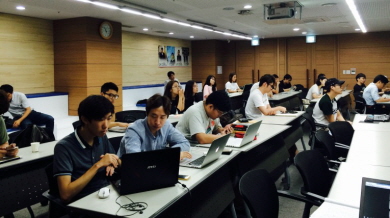
Another characteristic of independent presses is securing the anonymity of reporters. High Quality Zzirasi’s reporters have their own pen names such as “maple” and “blahblahmakkolli.” For articles posted on Jammanggyeong, not a single piece of information of reporters is written, not even pen names or e-mail addresses. Using anonymity is risky for press as it may lower the newspaper’s reliability and credibility. However, independent press has no choice but to keep its anonymity as the reporters often write articles that criticize the school which could lead the schools to give disadvantages to the reporters. Therefore, to be freed from any possible outer pressure, using anonymity is crucial for independent presses.
Even so, independent presses are subject to constant interferences from university authorities. The repressions range from refusing to be interviewed to taking legal actions against independent presses. Sungshin Publica, an independent press for Sungshin University, had a few run-ins with the school. Sungshin Publica wrote articles regarding university corruption, focusing mainly on Sungshin University’s corruption. The reporter who wrote the articles was called into a meeting with 10 professors including the vice president and the dean of Student Affairs, who questioned how and why the articles were written. Afterward, the school charged Sungshin Publica with defamation and blinded the articles containing information on corruption.
“During the time of legal actions, we issued a statement on our blog,” said Park Ye-ram, a member of Sungshin Publica. “At the time, the articles were blinded, but we have put them up again as normal now.”
Some other independent presses such as Kookmin Journal have not had such problems, but they have guidelines on how to deal with them if they confront external pressure and get into conflicts with the school authorities.
“We have never had an official complaint from the school yet,” Choi said. “If we did get factual corrections from the school, we would correct our articles. However, if the complaint was anything other than factual corrections, we would not react since we do not see the point of reacting to such complaints.”
Diversification of platforms
Independent presses are seeking to attract more readers through diversifying platforms ranging from mobile pages to broadcasting systems.
Chung-Ang University is also following the movement toward an online media. Jammanggyeong has a complementary system between the newspaper and the online sector. At first, Jammanggyeong had a one-sided communication structure as it is an independent journal and an anonymous medium. However, thanks to the establishment of their online website and activation of SNS, it drew a positive result of increased reports of readers, feedbacks and contribution to the newspaper.
Recently, it made “Jammanggyeong TV,” a broadcasting system updating conference videos regarding school issues. Moreover, it produces interviews, on-the-spot sketches and special reports.
To help out such movement, a digital media, Bloter, started a new project called “University Media Digital Learning Project.” The project consists of lectures on crisis of university media, digital journalism, producing websites, hosting, strategies to spread contents on SNS, pictures and video tools, and data journalism. Lectures were held on the themes of “Web publishing,” “Online cooperation and SNS strategy” and “Digital Contents Tool” during July and August.
The project proceeded for four weeks and about 30 students attended each class. Participants followed the four-week curriculum of the project and improved their knowledge as they worked in groups. This project changed participants’ minds to think that digital media can be applied to producing their own newspapers or news reporting without much difficulties.
“I felt the need to combine university media and digital platform in that there should be an online media students can easily approach,” said Chai Ban-seok, a reporter from Bloter. “Since most of our readers have smart phones and use Facebook, I thought it would be more convenient if they can read the news online.”
According to Chai, this combination could be achieved through providing students with contents that could be read on their mobile devices, since clicking the link on Facebook is much easier than finding something to read on newspapers.
Despite the convenience of digital media, there are some difficulties university reporters might face.
“Maintaining the online website could be burdensome for reporters since they have to keep working on the original newspapers simultaneously,” Chai said. “Also, some reporters who have difficulty in applying technical skills on their articles could feel uneasy about digitalization of media.”
Throughout these movements, students of independent newspapers have kept their voice on sensitive and controversial issues that are not sufficiently covered by school newspapers. Reporters of independent press will continue their efforts until students’ rights to know are undoubtedly guaranteed.
Ewha Voice
evoice@ewha.ac.kr

